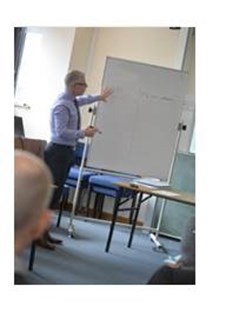Celebrating 30 years of cell culture training at ECACC. The end of an era, and start of a new one…

Cell culture is a critical tool for biological science research. It provides models for studying cellular physiology, drug screening and development, the effects of toxic compounds on cells, cancer research and large scale manufacturing of vaccines and therapeutics.
The advantages of the consistency and reproducibility provided by cell culture can only be fully realised if the work is carried out by expert scientists who are proficient in aseptic technique and the maintenance of valid cellular stocks, whilst being able to identify and trouble shoot problem cell cultures. A competent cell culture scientist should also not only be aware and mindful of the hidden issues of cell line misidentification, cross contamination and mycoplasma infection but also be skilled in the strategies to avoid these common pitfalls and the available testing solutions.
For over 30 years ECACC has been instrumental in the education of cell culture scientists through its regular and internationally renowned cell culture training courses and it is estimated that over this time around a thousand delegates have received direct training at the hands of ECACC staff. From their early origins as summer schools run at the University of Surrey the courses have constantly evolved to meet the changing demands of research yet at the same time stayed focussed on the core, essential activities. These include resuscitating cells from frozen, effective sub-culture, cryopreservation and the need to understand the biology of the cells being cultured whilst working in a safe, ethical and quality assured manner.
 Each year ECACC endeavours to deliver two comprehensive four day courses from its site at Porton Down, near Salisbury in Wiltshire, and a series of shorter Fast-Track basic two-day courses delivered at partner sites such as Durham University. The longer four day course is designed to give an in depth introduction to all aspects of cell culture including primary cell preparation and more advanced techniques whereas the more accessible Fast-Track course aims to cater for academic researchers to provide essential knowledge those embarking on projects involving cell culture.
Each year ECACC endeavours to deliver two comprehensive four day courses from its site at Porton Down, near Salisbury in Wiltshire, and a series of shorter Fast-Track basic two-day courses delivered at partner sites such as Durham University. The longer four day course is designed to give an in depth introduction to all aspects of cell culture including primary cell preparation and more advanced techniques whereas the more accessible Fast-Track course aims to cater for academic researchers to provide essential knowledge those embarking on projects involving cell culture.
Over the years the ECACC has welcomed many expert guest speakers to help deliver the courses and to add another dimension to the learning, none more prolific or esteemed than Dr R Ian Freshney, author and editor of many books relevant to the field including the essential Culture of Animal Cells; A Manual of Basic Technique (Wiley and Sons), now in its seventh edition. Ian has had a long and involved association with ECACC and it was sadness for all involved that last year when Ian announced his intent to retire and delivered his final set of lectures for us in October 2016. The staff of the Culture Collections of PHE offer Ian a heartfelt vote of thanks and best wishes for his well-deserved retirement.
It is with great pleasure, however, that following Ian’s retirement, ECACC announces that it will now be working closely with world renowned three dimensional (3D) cell culture expert Professor Stefan Przyborski from Durham University in the design and delivery of future training courses. Stefan has been a guest lecturer on the courses for several years and through this association has enabled the delivery of the Fast-Track course from his labs in Durham. ECACC course leaders are excited at the prospect of his increased involvement.
For more information regarding cell culture training contact us.
